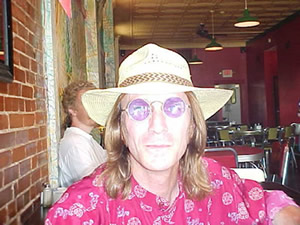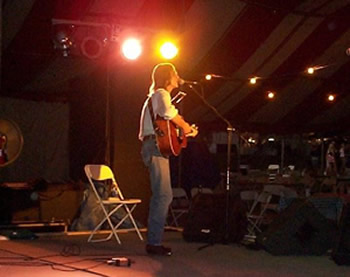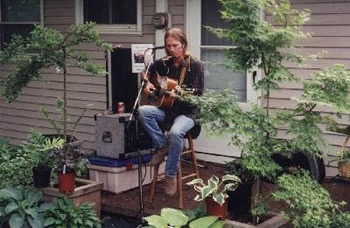The Artist as Entrepreneur |
|
Russ
Anderson |
Russ Anderson has been playing music professionally since 1978. He has played with bands, The Bullets and The Mustangs, and has had a solo career. He also plays on occasion as part of the trio, Silverlode.
He is currently working on a "best of" CD, and he markets his recording online and at his shows. His discography includes three releases: Arsenal Street (2003), Milo's Garden (1998), and New Day (1996). Anderson and his wife, Hongxia, were married in October of 2000. She is from a Hesheng in the Gansu Province in China, and she taught at a college in Lanzhou. She currently sells handcrafted items on her website. The merchandise is made by women in Hesheng. The Andersons reside in South St. Louis. The following interview with Russ Anderson was conducted by Cheryl Blake, UM-St. Louis, September 2004. Q. How long have you been supporting yourself with your music?
In 1978 I got a job playing Wednesdays at a local club, $25 for four hours a night. By 1988 I was supporting myself. Q. How did you go from those Wednesday evenings to opening for Brewer and Shipley? A. There's a county fair out in Washington, Missouri, and the organizers know me. I don't know why, but I work out in that area a lot. So they asked me if I wanted to open for Brewer and Shipley and, of course, I did. Q. Have you had to invest much into making music? A. I have replaced things and added over the years. I just upgraded a speaker for $250. I've added a drum machine. Some of the PA equipment will really last. I also have my own studio and I'm doing my own CD's. I'm using reel-to-reel and mix down to digital. I'd like to hire an engineer to work on the CD's, but engineers are expensive. Things that take me a long time to do, they can get through really fast. When I was with a band [The Mustangs], we were chasing the [recording] labels. But it's the accountants who call the shots instead of the artists. One time we called ahead and arranged to visit a big label in L.A. All we got to do was hand the demo to a secretary, just leave it on the doorstep. I record my own CD's and sell them on my website and at all of my shows. I'd tell someone thinking of going into the music business that if you can think of anything else you could do for a living, that you would be happy doing--do it, because if you are not completely into it, the business side of it is going to eat you alive. There's so much bull to put up with. I tried computer programming back in 1984. I went to school and then had a six-month job. My boss told me my work was good, but I just didn't fit in. He was right. I went back to music. But there are still times I ask myself, "What else could I do?" Q. How do you work with things like budgeting? A. Like any self-employment, you have to save for bad times. You have to guess when the bad times will be. January and February are usually pretty lean, but there might be a year when they are the best months. This has been a very good year. My price has gone up over the years, but there are a lot of weekend warriors out there. They have full time jobs during the week so they can play for less only on the weekends. Q. Do you work with an agent? A. Yes, and I do my own bookings too. I'd love to have an agent book me all the time, tell me, "I'm going to make sure you're working all the time." But no one has promised me that, so I don't sign an exclusive contract. Q. How do you get jobs? A. It's sales. I'll go to a paper and look at ads for bars. I'll phone and ask if I can send a demo. I'd suggest putting together a demo package. Have something to send out. Always call and get a name to address it to. Then I follow up and call back. A demo of a performance is good if you can do it. Take a look at Russ Anderson's website to see a live performance. copyright 2004, Center for Entrepreneurship and Economic Education, University of Missouri-St. Louis
|


